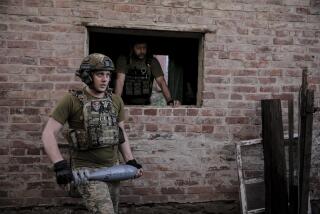Soviets Granted U.S. Food Credits : Diplomacy: Bush approves $1.5 billion to buy grain. The action is expected to help Gorbachev avoid political disruption that could threaten economic reforms.
- Share via
WASHINGTON — President Bush granted the Soviet Union $1.5 billion in agricultural credits Tuesday in a major step intended to help Mikhail S. Gorbachev feed his people and, at the same time, avoid the political instability that could disrupt economic reform and possibly threaten his grip on power.
Bush made credits worth $600 million available this month, $500 million available in October at the start of the next fiscal year and $400 million available in February, 1992.
The move reflects the piecemeal aid that the Administration is willing to offer the struggling Soviets to prod them into carrying out a major overhaul of their government-run economy--as well as the limits imposed by the state of the U.S. economy.
In a related move, Bush said he also would make available a team of government and private experts to help the Soviets improve their distribution system, which has choked the flow of food from farms to consumers, leaving many store shelves bare.
Bush informed Gorbachev of the actions in a cabled letter.
His decision provides U.S. farmers and banks with guarantees that up to $1.5 billion in loans to the Soviets for the purchase of the grain will be backed by the U.S. Treasury. As long as the Soviets repay the loans--as they have in the past--there should be no cost to the U.S. government.
White House Press Secretary Marlin Fitzwater said that Bush has received assurances from the Soviets that the grain made available through the credits “would be fairly distributed among Soviet republics and the Baltic states.”
“We will monitor that and we will check up on it,” he said.
Senate Minority Leader Bob Dole (R-Kan.) and others in Congress, while favoring the assistance, earlier had expressed concern that Lithuania, Latvia and Estonia would be shortchanged--or that the grain could be used as blackmail to pressure them into following a less independent path. But Dole hailed the decision Tuesday as “welcome news for American farmers, especially our grain producers.”
“The bottom line is we expect to be repaid. This is not a giveaway program,” he said.
An Administration official, speaking on condition of anonymity, said that Bush’s short-term goal is to help provide food for the Soviet Union and to avoid political disruption that food shortages could cause. His long-term goal, the official said, is to provide expertise needed to redesign the food distribution system. But, the official added, it is recognized in Washington that “Gorbachev will reap the side benefits.”
With this political goal in mind, the official said, Bush also is likely to grant the Soviet Union most-favored-nation trading status, the lower-tariff benefits that have been given to most U.S. trading partners but have been denied to the Soviets.
Last week, the President extended for one year a waiver of the 1974 law that restricts trade with the Soviet Union and other Communist countries deemed to have closed-door emigration policies.
As a result of the agricultural aid and the likely trade decision, the official said, “Gorbachev will reap the political benefits from showing his people he can work with the West and the West can work with him.”
In recent months, Bush had sent mixed signals about his decision on the aid, which Gorbachev had requested not long after he began to tap $1 billion in credits made available last December. Those credit guarantees have been depleted.
Bush at first indicated concerns about whether the Soviets would meet the government’s standards for credit-worthiness of borrowers. However, he and senior White House officials sent increasingly clear signals that he would find a way to provide the assistance, since Gorbachev had pulled back from his harsh approach during the winter toward the independence-minded Baltic republics and had begun to lean more toward economic reform.
Fitzwater said Tuesday that the Soviets “have never defaulted on an official loan involving this country.” It was Bush’s conclusion, he said, that “they can and will repay the (new) loans.”
The President’s action followed a meeting earlier this month with a delegation of some of Gorbachev’s key economic advisers and a tour of the Soviet Union by an American group led by Undersecretary of Agriculture Richard T. Crowder.
The U.S. group reported that the Soviet Union has an adequate food supply and is producing sufficient food to feed the nation but that empty shelves in markets are “a function of not being able to move the food around to all the various stores and outlets.”
“We think some real improvements can be made in that area,” Fitzwater said.
He added that “a good deal” of the U.S. grain would be used to feed cattle, sheep and poultry, “where there is, indeed, a problem.”
But the guarantees also would allow the Soviets to purchase food for which there is an immediate need, “and that will be taken care of in a matter of months,” he said.
Times staff writer Michael Parks in Moscow contributed to this article.
More to Read
Sign up for Essential California
The most important California stories and recommendations in your inbox every morning.
You may occasionally receive promotional content from the Los Angeles Times.













